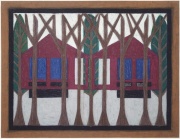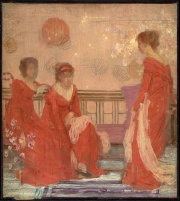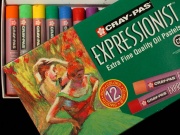Difference between revisions of "Oil pastel"
Jump to navigation
Jump to search
| Line 1: | Line 1: | ||
[[File:1986.195-SC25760.jpg|thumb|]] | [[File:1986.195-SC25760.jpg|thumb|]] | ||
== Description == | == Description == | ||
| − | + | [[File:60.1158-SC74241.jpg|thumb|Oil and Wax crayon on canvas; MFA# 60.1158]] | |
A soft pigmented, wax/oil-based drawing stick. Oil pastels contain a [[pigment]] or [[dye]] dispersed in a [[wax]] (such as [[paraffin wax|paraffin]] or [[microcrystalline wax|microcrystalline]]) base that is softened with a [[nondrying oil]] such as [[coconut oil]] or [[mineral oil]]. They may also contain [[tallow]], [[stearic acid]], and [[glycerol]] as well as fillers such as [[calcium carbonate]]. Oil pastels produce a soft, nondrying film that can be blended easily. They were first introduced as children's crayons in Japan in 1925. | A soft pigmented, wax/oil-based drawing stick. Oil pastels contain a [[pigment]] or [[dye]] dispersed in a [[wax]] (such as [[paraffin wax|paraffin]] or [[microcrystalline wax|microcrystalline]]) base that is softened with a [[nondrying oil]] such as [[coconut oil]] or [[mineral oil]]. They may also contain [[tallow]], [[stearic acid]], and [[glycerol]] as well as fillers such as [[calcium carbonate]]. Oil pastels produce a soft, nondrying film that can be blended easily. They were first introduced as children's crayons in Japan in 1925. | ||
| Line 27: | Line 27: | ||
* M.H.Ellis, "Oil Pastel", in Media and Techniques of Works of Art on Paper, New York University Conservation Center of the Institute of Fine Arts, New York, 1999. | * M.H.Ellis, "Oil Pastel", in Media and Techniques of Works of Art on Paper, New York University Conservation Center of the Institute of Fine Arts, New York, 1999. | ||
| − | |||
| − | |||
Latest revision as of 13:44, 2 October 2022
Description
A soft pigmented, wax/oil-based drawing stick. Oil pastels contain a Pigment or Dye dispersed in a Wax (such as paraffin or microcrystalline) base that is softened with a Nondrying oil such as Coconut oil or Mineral oil. They may also contain Tallow, Stearic acid, and Glycerol as well as fillers such as Calcium carbonate. Oil pastels produce a soft, nondrying film that can be blended easily. They were first introduced as children's crayons in Japan in 1925.
Synonyms and Related Terms
pastel crayon; oil crayon; Cray-Pas® [Sakura]; craypas (sp); Sketchos [Prang]
Physical and Chemical Properties
Soluble in most petroleum and chlorinated hydrocarbons.
Risks
Halos may form when used on absorbent material. Bloom may form on surface. Some colors are not lightfast.
Additional Images
Resources and Citations
- M.Holben Ellis, M.Brigitte Yeh, "Categories of Wax-based Drawing Media" WAAC Newsletter, Vol 19(3), 1997.
- M.H.Ellis, "Oil Pastel", in Media and Techniques of Works of Art on Paper, New York University Conservation Center of the Institute of Fine Arts, New York, 1999.




